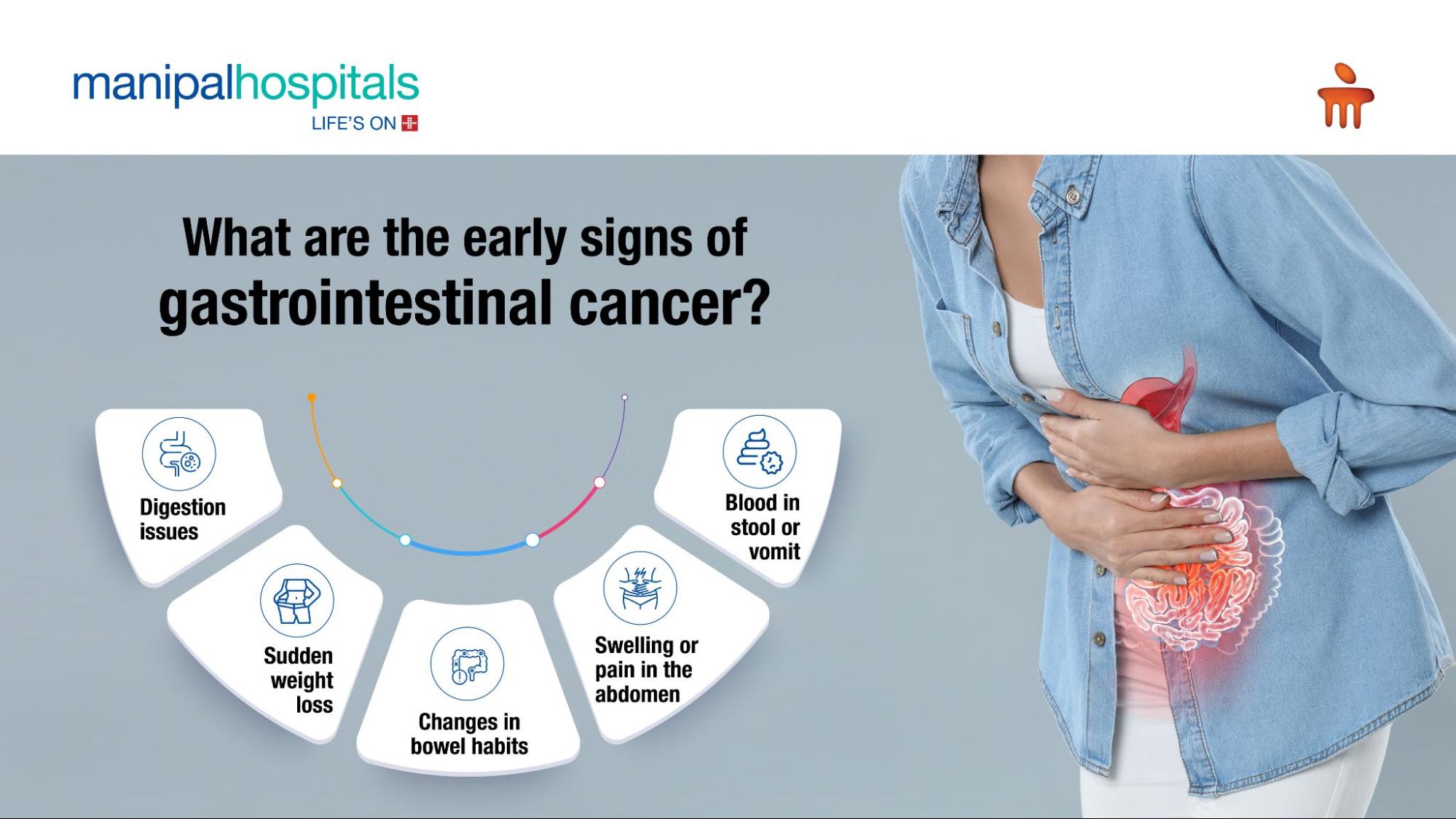Cancer cases are rising every day, impacting millions of people worldwide. Among various types of cancer, gastrointestinal cancer is one of the leading causes of death. Out of 4.8 million reported cancer cases, GI cancers are responsible for 3.4 million deaths. These cancers are curable only if they are detected in their early stages. Also, making certain changes in your lifestyle reduces the risk of developing gastrointestinal cancer. Let's explore the early signs of this disease and the mistakes to avoid for better treatment.
Synopsis
About Gastrointestinal Cancer
Gastrointestinal (GI) cancers are cancers of the digestive tract that affect the digestive system and its related organs, such as the oesophagus, stomach, liver, pancreas, gallbladder, colon, and rectum. The gastrointestinal tract plays a vital role in the body, digesting food and absorbing nutrients. These cancers arise from various tissues within the digestive system.
Early Signs of Gastrointestinal Cancer

As this type of cancer involves various organs, its symptoms vary as per location and subtype of cancer. Usually, gastrointestinal cancers show fewer symptoms in the early stages, which gets overlooked or mistaken for other common digestive issues. However, recognising these early signs can improve treatment outcomes.
Some common early signs that could indicate gastrointestinal cancer include:
1. Digestion issues: If you experience chronic indigestion, acid reflux, or heartburn that doesn't improve with medications, it could be a warning sign of oesophagal or stomach cancer.
2. Sudden weight loss: If you are losing weight rapidly, even without effort, then it could be a symptom of cancer affecting the stomach, pancreas, or liver.
3. Changes in bowel habits: If you are experiencing persistent diarrhoea, constipation, or some noticeable changes in the stool consistency that last for a few weeks, then it could be an indicator of colorectal cancer.
4. Swelling or pain in the abdomen: Never ignore unusual, persistent abdominal pain, cramps, discomfort or other stomach symptoms of cancer that don’t go away with usual treatments; it could be a sign of GI cancer.
5. Blood in stool or vomit: If you experience the presence of blood in stool or vomit, get an evaluation done by a doctor immediately; it could be an indicator of colorectal, gastric, or oesophagal cancer.
If you experience any of these signs of a tumor in stomach, undergo an evaluation by a gastrointestinal oncologist as soon as possible.
Gastrointestinal Cancer Mistakes You Should Avoid
Gastrointestinal cancers are usually preventable or curable if diagnosed and treated early. Avoid these common mistakes to improve your chances of survival with gastrointestinal cancer:
-
Never ignore its early signs: The body gives us alarming signals when something is wrong, so never ignore the early signs and symptoms of gastrointestinal cancers. If you experience ongoing digestive symptoms like indigestion, bloating, abdominal pain, or changes in bowel habits that last for more than a few weeks, consult a healthcare professional immediately.
-
Not getting regular screening: Colorectal cancer can be easily detected by undergoing regular screening. Get a regular colonoscopy if you are over 45 years of age and have a family history of colorectal cancer. Also, get regular health checkups done by a specialist doctor to avoid the risk of developing cancer.
-
Avoid self-medication: Never indulge in taking over-the-counter medicines through self-medication for persistent symptoms. It can mask the underlying issues and delay the diagnosis. Following the doctor's advice for treating any issue is essential.
-
Ignoring your family history: Genetics increases the risk of developing GI cancers. So, make sure you know your family's history of gastrointestinal cancers, as it can help identify your potential genetic risk and prompt its early screening.
-
Neglecting risk factors: Lifestyle factors are crucial in preventing GI cancer. Adopting a bad lifestyle like consuming alcohol, smoking, eating a poor diet, being obese, and not exercising increases your chances of developing GI cancer. So, reduce these risks by following a good lifestyle for a disease-free life.
Consult our gastroenterology hospital in Kolkata if you are experiencing signs and symptoms of stomach cancer
FAQ's
Family history plays an important role, mainly in certain hereditary cancer syndromes. It increases the risk of developing cancer, especially colorectal cancer. Knowing your family history can guide early screening and preventive measures.
If you experience persistent symptoms like indigestion, changes in bowel habits, abdominal swelling or pain, or rapid weight loss that lasts for more than a few weeks, consult a healthcare provider promptly. Our team is experienced in rapidly diagnosing and appropriately treating these GI cancers.
The common screening tests available for GI cancer include:
-
Colonoscopy for colorectal cancer
-
Upper endoscopy for stomach and oesophagal cancers
-
Stool tests for colorectal cancer
-
Imaging tests like ultrasound, CT scan, and MRI for liver, gallbladder, and pancreatic cancers
-
Blood tests
-
ERCP
-
Endoscopic Ultrasound(EUS) for Pancreatic Cancer detection and biopsy
Gastrointestinal cancers can be prevented by making certain changes in your lifestyle choices. Follow these tips:
-
Eat a healthy diet
-
Maintain your weight
-
Limit alcohol consumption
-
Quit smoking
-
Exercise regularly
-
Get vaccinated and have regular screening
-
Take a good sleep
To schedule an appointment at Manipal Hospitals, contact our oncology department or visit our website.





















 5 Min Read
5 Min Read

















